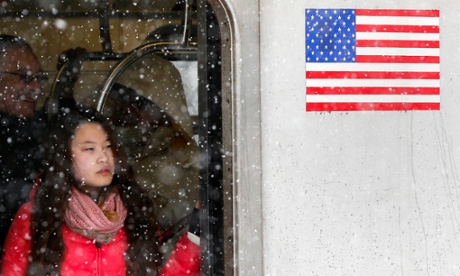
Finally, a study has confirmed what New Yorkers have long known: our commute is too darn long and expensive.
The average New Yorker’s workweek is 49.1 hours long, according to a new study. But it’s not because they are working so much – it’s because they spend about six hours a week commuting.
“This means employees in the Big Apple get paid less than it appears on an hourly basis, because their commutes are significantly greater than anyone else in the country,” said New York City comptroller Scott Stringer, whose office released the report that analyzed commutes in major US cities.
New Yorkers spend on average two hours more a week commuting than full-time workers in the 29 next largest US cities.
Living in New York, of course, means earning New York wages: on average, the city’s full-time workers earn about 16% more than workers in other large cities. Since the cost of living in New York City is one of the highest in the US, many of these workers need every dollar they earn to make ends meet. Yet their daily commute can cut into those earnings, especially for workers at the bottom of the food chain.
Consider this: CEOs, doctors and surgeons report some of the shortest commutes. Even when accounting for time spent commuting, New York lawyers and judges and other white-collar workers still earn 15% more than their counterparts in other corners of the US.
Others are not as lucky. New York cooks earn just 8% more than those in other cities, waitresses just 4%.
“Due to long commutes and lower pay, nursing and home healthcare aides earned an effective wage premium that was 11% less than their counterparts in other large cities even before adjusting for the higher cost of living,” states the report.
Not only is the daily commute cutting into New Yorkers’ monthly earnings, but it’s also costing them a pretty penny. This Sunday, a single trip on the city’s subway will rise to $2.75, from $2.50, and a monthly Metrocard pass will now cost $116.50 instead of $112. As of January, New York’s minimum wage is $8.75 an hour. That means those earning minimum wage in the city have to work the equivalent of 13 hours just to be able to buy a monthly transit pass – and more if we account for income tax.
How does the commute break down by mode of transportation? Those relying on public transportation like the bus or subway spent about seven and a half to eight hours commuting each week, the equivalent of an extra work day. Those commuting by car were able to cut their weekly commute to 5.3 hours. Those biking to work? About three and a half hours. And those lucky enough to be able to afford a daily cab ride or two spent just three hours on the road each week.
Commuting across the US: driving versus public transportation
New Yorkers are not the only ones losing hours each week tho their daily commute. Residents of Chicago and Philadelphia spend on average at least five hours a week commuting; people living in San Francisco and Los Angeles spend about four and a half hours on the road, driving and sitting in traffic.
“Driving is one of the more dangerous things that people do every day,” says Leon James, professor of psychology at University of Hawaii and author of Road Rage and Aggressive Driving.
Some assume that commuting by train is less stressful than traveling by car. After all, you can just sit back, read a book or listen to a podcast instead of having to pay attention to the road. Yet as any veteran New York commuter can attest, most daily commutes are anything but peaceful.
There is a certain anxiety that comes with traveling on trains that can get stuck underground and are many times overcrowded, cramped and smelly, says James. Often commuters end up smelling and touching each other, unlike in a car where you have your own space.
“On the train, your personal space is not guaranteed. Anyone can invade it,” he says.
That physical closeness does have one thing going for it – New Yorkers tend to bond over hellish commutes. But be careful about venting after the fact, at work or at home, warns James. Mental unloading can quickly become an emotional habit and intensify the stress of your daily commute.
But what does a professor living in Hawaii know about traffic and stress, anyway? Quite a bit, apparently.
“Like everywhere else, there are people bunched together here,” he says. “People re-create traffic everywhere they go.”

